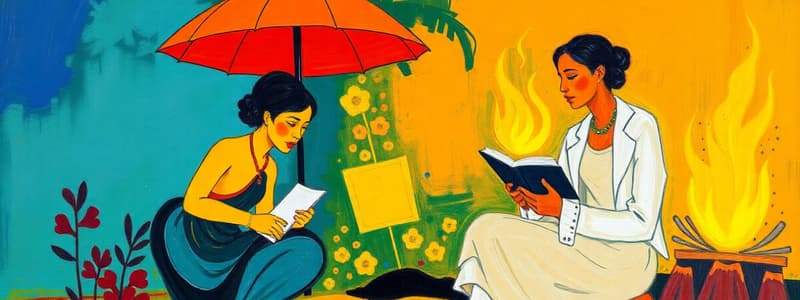Podcast
Questions and Answers
What are the provinces in Region I?
What are the provinces in Region I?
Ilocos Norte, Ilocos Sur, La Union, and Pangasinan
What is the significance of translation for Ilokano writers?
What is the significance of translation for Ilokano writers?
Translation allows the work to be understood by a wider audience but may limit the authenticity of the original writing.
What is Lam-ang?
What is Lam-ang?
An epic that has survived colonization in Ilokano literature.
What are the forms of performance art mentioned in Ilokano literature?
What are the forms of performance art mentioned in Ilokano literature?
What does the term 'kablaaw' refer to?
What does the term 'kablaaw' refer to?
Who is Pedro Bukaneg?
Who is Pedro Bukaneg?
What characterizes Ilokano myths?
What characterizes Ilokano myths?
Which of the following is NOT a form of Ilokano literature?
Which of the following is NOT a form of Ilokano literature?
Ilokano literature is only focused on local themes and issues.
Ilokano literature is only focused on local themes and issues.
Flashcards
Arikenken
Arikenken
A poetic form from the Ilocos region where performers use witty verses and repartee to engage in intellectual duels.
Colonial Influence on Ilocano Literature
Colonial Influence on Ilocano Literature
The impact of colonization on Ilokano culture is evident in the epic "Lam-ang" which reflects the integration of Catholic practices into the narrative.
Kablaaw
Kablaaw
An Ilocano cultural value that emphasizes respect, deference, and acknowledging the authority and status of others.
Dallot
Dallot
Signup and view all the flashcards
Ilocano Literature
Ilocano Literature
Signup and view all the flashcards
Dung-aw
Dung-aw
Signup and view all the flashcards
Ilocano Oral Traditions
Ilocano Oral Traditions
Signup and view all the flashcards
Ilocano Cosmology
Ilocano Cosmology
Signup and view all the flashcards
Ilocano Adaptation to Change
Ilocano Adaptation to Change
Signup and view all the flashcards
Study Notes
Region 1: Ilocos
- Region 1 comprises of Ilocos Norte, Ilocos Sur, La Union, and Pangasinan.
- Ilocano literature, considered a part of the national literature, is often translated to English and/or Filipino for wider reach.
- Translation poses a challenge for Ilocano writers as they must adapt to the cultural context of the wider audience, potentially limiting their creative space.
- The epic "Lam-ang," which survived colonization, reveals the impact of colonialism on Ilocano culture, including traces of Catholic practices.
- Indigenous traditions like burtia/burburtia (riddles) and pagsasao (sayings) reflect the Ilocano's philosophical insights rooted in their historical and cultural experiences.
- The dallot, a chant during weddings and birthdays, and the dung-aw, a chant narrating life stories, are performance art forms pre-dating drama.
- The dallot showcases the communal aspect of marriage in Ilocano culture.
- The Ilocano culture values direction and community in everyday life, exemplified by their emphasis on honor and the concept of "kablaaw" (tribute).
- The arikenken (verbal joust) is considered a precursor to the bukanegan, named after Pedro Bukaneg, a renowned colonial-era poet.
- Bukanegan demonstrates the sophistication of Ilocano minds through argumentation as an art form.
- Ilocano myths reflect a complex understanding of cosmology and ontology, exploring the hierarchy of existence, space, time, and human place in the universe.
- The Ilocano tradition, while stabilizing society, has also welcomed change through capitulation, revolt, and struggle.
- Writers like Carlos Bulosan and Manuel Arguilla have explored Ilocano experiences and sensibilities in their works, highlighting the struggles and hopes of their communities.
- Ilocano literature aims to portray the distinct life of Ilocanos while transcending that uniqueness by creating universal images and narratives.
- Ilocano literature reflects the migrant experience, exploring both the loneliness and potential of a new land where the Ilocos cannot be replaced but offers new opportunities.
Studying That Suits You
Use AI to generate personalized quizzes and flashcards to suit your learning preferences.
Related Documents
Description
Test your knowledge about the rich culture and literature of the Ilocos Region, encompassing Ilocos Norte, Ilocos Sur, La Union, and Pangasinan. Explore topics like Ilocano literature, traditional chants, and indigenous practices that highlight the community's historical experiences and cultural values.




